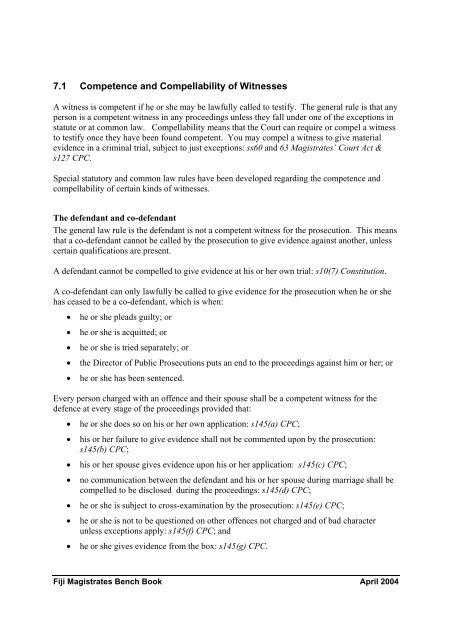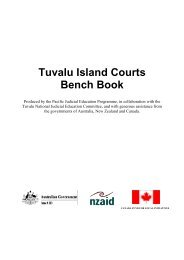Fiji Magistrates Bench Book - Federal Court of Australia
Fiji Magistrates Bench Book - Federal Court of Australia
Fiji Magistrates Bench Book - Federal Court of Australia
Create successful ePaper yourself
Turn your PDF publications into a flip-book with our unique Google optimized e-Paper software.
7.1 Competence and Compellability <strong>of</strong> Witnesses<br />
A witness is competent if he or she may be lawfully called to testify. The general rule is that any<br />
person is a competent witness in any proceedings unless they fall under one <strong>of</strong> the exceptions in<br />
statute or at common law. Compellability means that the <strong>Court</strong> can require or compel a witness<br />
to testify once they have been found competent. You may compel a witness to give material<br />
evidence in a criminal trial, subject to just exceptions: ss60 and 63 <strong>Magistrates</strong>’ <strong>Court</strong> Act &<br />
s127 CPC.<br />
Special statutory and common law rules have been developed regarding the competence and<br />
compellability <strong>of</strong> certain kinds <strong>of</strong> witnesses.<br />
The defendant and co-defendant<br />
The general law rule is the defendant is not a competent witness for the prosecution. This means<br />
that a co-defendant cannot be called by the prosecution to give evidence against another, unless<br />
certain qualifications are present.<br />
A defendant cannot be compelled to give evidence at his or her own trial: s10(7) Constitution.<br />
A co-defendant can only lawfully be called to give evidence for the prosecution when he or she<br />
has ceased to be a co-defendant, which is when:<br />
• he or she pleads guilty; or<br />
• he or she is acquitted; or<br />
• he or she is tried separately; or<br />
• the Director <strong>of</strong> Public Prosecutions puts an end to the proceedings against him or her; or<br />
• he or she has been sentenced.<br />
Every person charged with an <strong>of</strong>fence and their spouse shall be a competent witness for the<br />
defence at every stage <strong>of</strong> the proceedings provided that:<br />
• he or she does so on his or her own application: s145(a) CPC;<br />
• his or her failure to give evidence shall not be commented upon by the prosecution:<br />
s145(b) CPC;<br />
• his or her spouse gives evidence upon his or her application: s145(c) CPC;<br />
• no communication between the defendant and his or her spouse during marriage shall be<br />
compelled to be disclosed during the proceedings: s145(d) CPC;<br />
• he or she is subject to cross-examination by the prosecution: s145(e) CPC;<br />
• he or she is not to be questioned on other <strong>of</strong>fences not charged and <strong>of</strong> bad character<br />
unless exceptions apply: s145(f) CPC; and<br />
• he or she gives evidence from the box: s145(g) CPC.<br />
<strong>Fiji</strong> <strong>Magistrates</strong> <strong>Bench</strong> <strong>Book</strong> April 2004
















